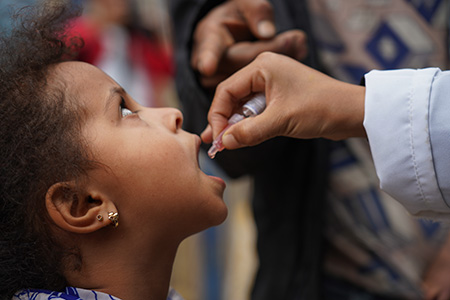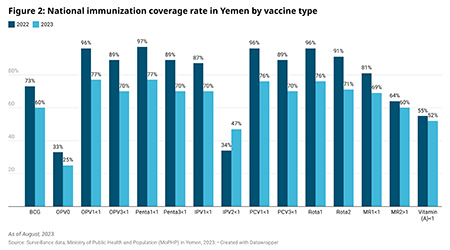 24 October 2023, Sana’a, Yemen – Yemen is facing a significant drop in immunization rates among children. This decline continues to worsen owing to economic deterioration, low incomes, displacement, and overcrowded living conditions in camps, coupled with an overstretched health system. This has led to a resurgence and rise in vaccine-preventable diseases and associated deaths among children in Yemen.
24 October 2023, Sana’a, Yemen – Yemen is facing a significant drop in immunization rates among children. This decline continues to worsen owing to economic deterioration, low incomes, displacement, and overcrowded living conditions in camps, coupled with an overstretched health system. This has led to a resurgence and rise in vaccine-preventable diseases and associated deaths among children in Yemen.
Millions of children cannot be reached by routine immunization activities, and suspected cases of vaccine-preventable diseases have reached unprecedented levels. According to the WHO-UNICEF National Immunization Coverage Estimate for 2022, about one third (27%) of children aged under 1 year in Yemen are not immunized against measles and rubella. Nor have these children received the minimum remaining vaccines required for full protection.
From January to September 2023, 42 400 children in Yemen had measles, and there were 514 associated deaths. In addition, there were about 1400 diphtheria cases and 6000 cases of whooping cough among Yemen’s children.
The re-emergence in Yemen of poliovirus type 1 (cVDPV1), in 2020, was soon followed by the re-emergence of poliovirus type 2 (cVDPV2), in 2021. This has put Yemen back on the world map of 35 countries currently afflicted by this debilitating and incurable disease. So far in 2023, there have been 928 suspected cases among Yemen’s children of acute flaccid paralysis, which can be caused by the poliovirus.
 View Chart 1 in an interactive format“The pattern of immunization levels for all vaccines is declining, especially this year. This has direct and severe health implications for children and for Yemen’s future. The reduced demand by communities and parents for immunization will cause the spread of deadly childhood and infectious diseases, especially those that can be prevented by vaccines,” said Dr Arturo Pesigan, WHO Representative and Head of Mission in Yemen.
View Chart 1 in an interactive format“The pattern of immunization levels for all vaccines is declining, especially this year. This has direct and severe health implications for children and for Yemen’s future. The reduced demand by communities and parents for immunization will cause the spread of deadly childhood and infectious diseases, especially those that can be prevented by vaccines,” said Dr Arturo Pesigan, WHO Representative and Head of Mission in Yemen.
“Yemen’s health system is already overstretched, yet it faces a rapid increase in health emergencies that is beyond its capacity,” added Dr Pesigan. “Health facilities can barely continue to provide basic health services. And with the shortage of international support, many facilities will be forced to shut down operations. This will put millions of vulnerable people in Yemen at imminent risk.”
WHO efforts in Yemen
WHO works closely with Yemen’s Ministry of Public Health and Population and health partners to increase support for routine vaccination interventions. WHO also continues to work within the National Health Framework to provide technical and financial support to improve immunization rates among children.
 View Chart 2 in an interactive formatThese efforts include work to:
View Chart 2 in an interactive formatThese efforts include work to:
enhance national disease surveillance and data management, ensuring timely detection of cases;
maintain public health teams dedicated to vaccine-preventable diseases;
improve the quality and coverage rates of preventive and outbreak response campaigns;
support the implementation of the equity accelerator proposal to reduce the number of zero-dose children; and
implement integrated vaccination and outreach campaigns.
Since the re-emergence of cVDPV1 and cVDPV2, WHO has closely supported the Ministry of Public Health and Population to develop a polio outbreak response plan; implement outbreak response immunization activities; and intensify surveillance, advocacy and capacity-building efforts.
Learn more about Yemen’s Expanded Programme on Immunization.
For more information, visit: Yemen Health Emergency
Media contacts: WHO Yemen Communications,
About WHO: Since 1948, the World Health Organization (WHO) has been the United Nations agency dedicated to advancing health for all, so that everyone, everywhere can attain the highest level of health. WHO leads global efforts to expand universal health coverage, direct and coordinate the world’s responses to health emergencies and connect nations, partners and people to promote health, keep the world safe and serve the vulnerable.








